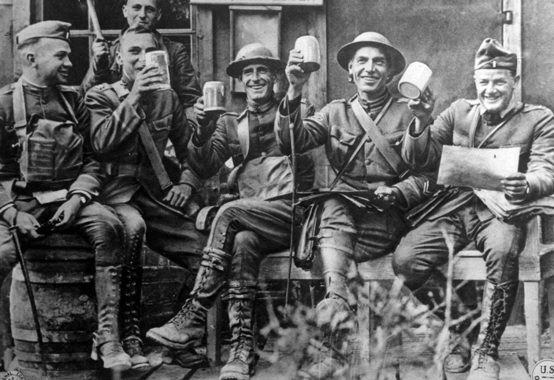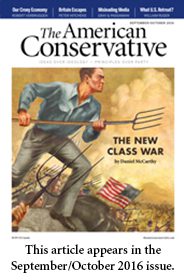Living by War

Tribe, by celebrated journalist and war correspondent Sebastian Junger, is a book that explores the feelings of isolation and anomie of returning veterans. It is important simply because the immense burden of these experiences, held by such a minuscule segment of the population, will only grow for the foreseeable future.
During an historical moment in which the sheer number of our troops has dropped, our military responsibilities around the globe continue to expand. This year we elect a third commander in chief to preside over our ongoing military operations in Afghanistan and Iraq. U.S. AFRICOM is browsing potential locations for a second base in Africa. Our military budget slated specifically for Europe will more than quadruple going into 2017, and our troop presence in Eastern Europe is almost certain to grow along with it.
Our veterans’ experiences are profoundly valuable, and every expression or consideration of them deserves our attention. But while Tribe is important, it falls far short of what it could have been.
Junger makes the crucial and often overlooked observation that not every aspect of combat is negative. In war there is squalor, boredom, and deprivation punctuated by intensely stressful moments of traumatic violence, of course. But there’s also a singular sense of purpose and the establishment of ad hoc community. People are able to experience things vital to being human in war that they can’t get in the civilian world.
Why veterans can’t access these human essentials outside of a combat zone is the key question Junger fails to fully explore. His assertions that modern society is “so unappealing,” “a desperate cycle of work, financial obligation, and more work,” and a cheap, fractured, and alienated culture that has “perfected the art of making people feel not necessary” demand some serious analysis. But Junger pulls his punches. He doesn’t explain why our society is fractured and lonely in the first place. He gestures at a large and complex critique of contemporary Western culture without ever actually sinking his teeth in. He gives us constellations of dots but leaves us to connect them ourselves. And since the questions he asks could be used to interrogate the rationale of our market-driven, community-destroying individualist culture, one is left wondering if Junger balked on the follow-through out of fealty to the very consensus his work implicitly condemns.
For years now, on public radio, in Vanity Fair, and in TED Talks, Junger has been telling the stories of veterans who return home from the horrors of war only to find that home doesn’t quite live up to their expectations. In a counterintuitive twist, Junger tells us that it’s returning to the civilian world that unmoors veterans, not combat. Junger writes, “Given the profound alienation of modern society, when combat vets say that they miss the war, they might be having an entirely healthy response to life back home.” Either the world is crazy or veterans are, and Junger puts his money on the world. In combat, veterans had community, a sense of worth and purpose, the joy of sacrifice, and a kind of egalitarianism—in race and class, if not rank—that simply doesn’t exist in the civilian world. Or is extraordinarily rare, at least.
Drawing on his formal training as an anthropologist, Junger discusses social scientist Charles Fritz’s theory that, in Junger’s words,
modern society has gravely disrupted the social bonds that have always characterized the human experience, and that disasters thrust people back into a more ancient, organic way of relating. Disasters, [Fritz] proposed, create a ‘community of sufferers’ that allows individuals to experience an immensely reassuring connection to others. As people come together to face an existential threat, Fritz found, class differences are temporarily erased, income disparities become irrelevant, race is overlooked and individuals are assessed simply by what they are willing to do for the group. It is a kind of fleeting social utopia that, Fritz felt, is enormously gratifying to the average person and downright therapeutic to people suffering from mental illness.
Junger uses this idea of a “community of sufferers” to broaden the scope of Tribe to include civilian survivors of other wars and catastrophes and, oddly enough, North American Indian tribes. Junger writes,
It may say something about human nature that a surprising number of Americans—mostly men—wound up joining Indian society rather than staying in their own. They emulated Indians, married them, were adopted by them, and on some occasions even fought alongside them. And the opposite almost never happened: Indians almost never ran away to join white society. Emigration always seemed to go from the civilized to the tribal, and it left Western thinkers flummoxed about how to explain such an apparent rejection of their society.
Ignoring for a moment that Indians certainly did join European communities, and that there was as much variation among tribes as there was diversity among European cultures, it’s important to note what Junger is trying to do here. In spending a solid third of the book connecting the idealized tribal experiences of American Indians with the accounts of returned veterans, Junger avoids having to pass moral judgment on our own culture. The qualities required to be completely and happily human, to have true community, become locked away behind the rarified experiences of the veteran or are hidden in the primordial mist with the noble savage. Community and sanity are presented as unavoidably the exception to “normal,” modern societal functioning, a temporary consequence of upheaval and not a practical political or moral goal.
The same holds true when he writes about other “disaster communities.” Junger spent some time in Sarajevo during and after the war there, and of that he writes, “The one thing that might be said for societal collapse is that—for a while at least—everyone is equal.” (This may not be quite true.) Also: “Communities that have been devastated by natural or man-made disasters almost never lapse into chaos and disorder; if anything, they become more just, more egalitarian, and more deliberately fair to individuals.”
It’s a sentiment reminiscent of Rebecca Solnit’s A Paradise Built in Hell. But whereas Solnit thinks this phenomenon speaks to the fundamental character of humans, Junger seems to suggest that this sort of “tribal” response to disasters must be a survival response, like the super-strong mom who is able to lift a car off of her baby. It’s a bridge too far for Junger to entertain the notion that perhaps healthy communities arise out of disasters because the political and economic forces that cultivate our hyper-individuality have broken down. He does hint at it, but fails to follow through, when he writes that “the beauty and tragedy of the modern world is that it eliminates many situations that require people to demonstrate a commitment to the collective good.”
Drawing from self-determination theory, Junger cites three basic things that human beings need in order to be content: to feel competent at what they do, to feel authentic, and to experience connection. “These values are considered ‘intrinsic’ to human happiness,” Junger writes, “and far outweigh ‘extrinsic’ values such as beauty, money, and status.” As he makes clear, these values don’t exist solely in combat. Junger points to cops, firefighters, and even Amish society as tight-knit groups that experience some of them. But instead of staking his claim on these moral values and taking them as final ends to move our society toward, Junger stuffs the book with pathologized facts and filler anecdotes.
 It makes for breezy reading, but if our society truly is strangling itself to death with disconnection and acquisitiveness, Tribe is not a very reassuring response. In fact, after more than 100 pages of describing a culture with roots buried shallow in nihilism, Junger yields up as a solution offering “veterans all over the country the use of their town hall every Veterans Day to speak freely about their experiences at war.” Not a bad idea in and of itself, but to call it treating the symptoms would be generous.
It makes for breezy reading, but if our society truly is strangling itself to death with disconnection and acquisitiveness, Tribe is not a very reassuring response. In fact, after more than 100 pages of describing a culture with roots buried shallow in nihilism, Junger yields up as a solution offering “veterans all over the country the use of their town hall every Veterans Day to speak freely about their experiences at war.” Not a bad idea in and of itself, but to call it treating the symptoms would be generous.
Tribe is a cleverly written book—not despite all its flaws but because of them. Junger somehow presents what should be a condemnation of our sick postmodern culture in a way that won’t scare away room-temperature liberals. I don’t think it’s an accident that Junger invokes the noble-savage standby without actually telling the story of how our culture ended up where it is. He wants to lend the quasi-credibility of historical narrative to a book that, were it to actually tell us how we ended up so fractured, would more closely resemble Christopher Lasch’s The True and Only Heaven in scope and length and Richard Sennett’s The Corrosion of Character in tone.
“There’s no use arguing that modern society isn’t a kind of paradise,” Junger writes before listing the combustion engine, the Internet, the global logistics chain, and cutting-edge pharmaceuticals as things that make our utopia so self-evident. “And yet”—Junger impregnates the pause by giving these two words a line all to themselves. Then he launches into a dirge over lost community. Although he doesn’t explicitly say it, the implication is that loss of community is the price we pay for convenience and technology.
It’s another interesting assertion left to dangle in the air, unchallenged and unexplored.
Scott Beauchamp is a veteran and writer based in Portland, Maine.
Comments